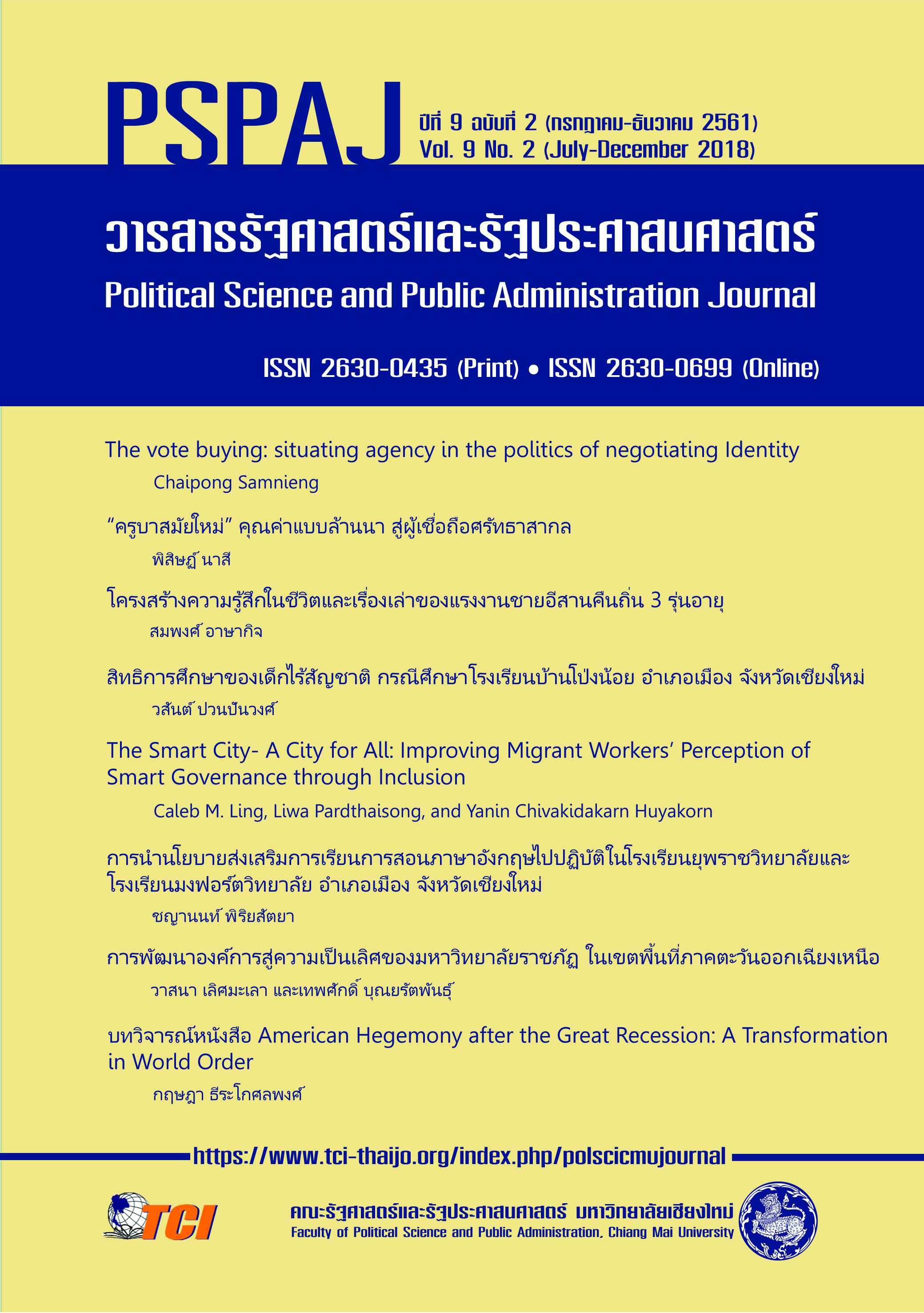Organization Development Toward High Performance Organization of Rajabhat Universities in Northeastern Region
Main Article Content
Abstract
The purposes of this study were to (1) study the successful level of organization development toward high performance organization of Rajabhat Universities in Northeastern region (2) compare the deferential level of organization development toward high performance organization of Rajabhat Universities in Northeastern region (3) study factors influencing the success of organization development toward high performance organization of Rajabhat Universities in Northeastern region and (4) recommend appropriate guidelines for enhancing further success of the organization development toward high performance organization of Rajabhat Universities in Northeastern region.
This study was a survey research. Population was 8,339 lecturers and officers at 11 Rajabhat Universities in Northeastern region. The sample consisted of 382 people, calculated by using Taro Yamane formula at 95% confidence level with stratified random samplings and simple sampling. The research instruments were a questionnaire an open-ended questionnaire, an In-depth interview was conducted with 3 university representatives: Loei Rajabhat University, Roi-Et Rajabhat University and Sisaket Rajabhat University. The statistical tool for data analysis was t-test, One Way ANOVA and Multiple Regression Analysis.
Research results revealed that (1) the successful level of organization development toward high performance organization of Rajabhat Universities in Northeastern region was not less than 80%, (2) The success of organization development toward high performance organization of Rajabhat Universities in Northeastern region was at a deferential level, (3) An analysis of the relationship between those factors and the results of organization development toward high performance organization of Rajabhat Universities in Northeastern region showed that Competency, Human Resource Management: HR Scorecard, Strategic Management, Teamwork and Strategic Leadership Influenced on the successful level of organization development toward high performance organization of Rajabhat Universities in Northeastern region, and (4) The results of this research suggested that personnel should be encouraged to understand core competencies and job competencies, motivating personnel to use technology to increase productivity, giving an opportunity for personnel to participate in strategic planning and to understand the organizational direction, promoting teamwork and accepting different opinions and managing should focus on the goals of the organization and finding solutions to the problematic management in case of change management.
Downloads
Article Details
- เนื้อหาและข้อมูลที่ลงตีพิมพ์ในวารสารรัฐศาสตร์และรัฐประศาสนศาสตร์ถือเป็นข้อคิดเห็นและความรับผิดชอบของผู้เขียนบทความโดยตรง ซึ่งกองบรรณาธิการวารสารรัฐศาสตร์และรัฐประศาสนศาสตร์ ไม่จำเป็นต้องเห็นด้วย หรือร่วมรับผิดชอบใดๆ
- บทความและข้อมูล ที่ได้รับการตีพิมพ์ในวารสารรัฐศาสตร์และรัฐประศาสนศาสตร์ ถือเป็นลิขสิทธิ์ของวารสาร หากบุคคลหรือหน่วยงานใดต้องการนำข้อมูลไปใช้ประโยชน์ในทางวิชาการ ขอให้อ้างอิงแหล่งที่มาด้วย
References
ชนิดา ยุวบูรณ์. (2551). ปัจจัยที่มีอิทธิพลต่อการเป็นองค์การที่มีผลการปฏิบัติงานเป็นเลิศ: ศึกษาเฉพาะกรณี บริษัท ปตท. จำกัด (มหาชน). (รายงานดุษฎีนิพนธ์ ปรัชญาดุษฎีบัณฑิต), มหาวิทยาลัยรามคำแหง.
ถวิลวดี บุรีกุล. (2557). การบริหารจัดการบ้านเมืองที่ดี. ใน เอกสารประกอบการสอนชุดวิชาการบริหารงานภาครัฐ. (น. 237-247). นนทบุรี: มหาวิทยาลัยสุโขทัยธรรมาธิราช.
เทพศักดิ์ บุญรัตพันธุ์. (2552). การมีส่วนร่วมของประชาชนและภาคสังคม. ใน เอกสารการสอนชุดวิชาหลักและวิธีการศึกษาทางรัฐประศาสนศาสตร์. (น. 5). นนทบุรี: มหาวิทยาลัยสุโขทัยธรรมาธิราช.
______. (2553). นโยบายสาธารณะกับการวางแผนยุทธศาสตร์. ใน เอกสารนโยบายสาธารณะ. (น. 4-6). นนทบุรี: มหาวิทยาลัยสุโขทัยธรรมาธิราช.
เนตร์พัณณา ยาวิราช. (2549). ภาวะผู้นำและผู้นำและเชิงกลยุทธ์. กรุงเทพฯ: บริษัทเซ็นทรัลเอ็กซ์เพรส จำกัด.
ภัทรวดี ชวนบุญ. (2555). การศึกษาการพัฒนาศักยภาพองค์การเพื่อความเป็นเลิศของเทศบาลนครอ้อมน้อย จ.สมุทรสาคร. (วิทยานิพนธ์ปริญญามหาบัณฑิต), มหาวิทยาลัยมหิดล.
รักเกียรติ หงษ์ทอง, วัชระ ยาคุณ, พลศักดิ์ จิรไกรศิริ, และพรสรร โรจนพานิช. (2558). ประสิทธิผลขององค์การกับตัวแบบภาวะผู้นำเชิงวิสัยทัศน์ของคณะผู้บริหารมหาวิทยาลัยราชภัฏตะวันตก. วารสารวิชาการและวิจัยสังคมศาสตร์ มหาวิทยาลัยราชภัฏนครสวรรค์, 10(29), 71-86.
รังสรรค์ ประเสริฐศรี. (2551). ภาวะผู้นำเชิงกลยุทธ์. การจัดการสมัยใหม่, 6(2), 13.
วิภาส ทองสุทธิ์. (2551). การบริหารจัดการที่ดี. กรุงเทพฯ: อินทภาษ.
วิรัช สงวนวงศ์วาน. (2554). การจัดการและพฤติกรรมองค์การ. กรุงเทพฯ: บริษัท วี พริ้นท์ (1991) จำกัด.
สถาบันพระปกเกล้า. (2554). การบริหารงานที่เป็นเลิศขององค์กรปกครองส่วนท้องถิ่น 2554. (รายงานการวิจัยปริญญามหาบัณฑิต), สถาบันพระปกเกล้า.
สุภาภรณ์ ธานี. (2553). กลยุทธ์การนำองค์การสู่ความเป็นเลิศของ เทศบาลตำบลนาส่วง อำเภอเดชอุดม จังหวัดอุบลราชธานี. (รายงานการศึกษาอิสระปริญญารัฐประศาสนศาสตรมหาบัณฑิต), มหาวิทยาลัยขอนแก่น.
สำนักงานคณะกรรมการข้าราชการพลเรือน. (2547). แนวทางการประเมินระบบบริหารทรัพยากรบุคคล. กรุงเทพฯ: กลุ่มโรงพิมพ์สำนักบริหารกลาง.
______. (2548). คู่มือสมรรถนะราชการพลเรือนไทย. กรุงเทพฯ: บริษัท พี.เอ.ลิฟวิ่ง จำกัด.
______. (2552). ความรู้ความสามารถ ทักษะและสมรรถนะที่จำเป็นสำหรับตำแหน่ง. กรุงเทพฯ: บริษัท พี.เอ.ลิฟวิ่ง จำกัด.
สำนักงานคณะกรรมการพัฒนาระบบราชการ (สำนักงาน ก.พ.ร.). (2549). แนวทางการเสริมสร้างจริยธรรม คุณธรรมและการปรับเปลี่ยนกระบวนทัศน์ข้าราชการ. กรุงเทพฯ: ม.ป.พ.
______. (2555). หลักธรรมาภิบาลของการบริหารกิจการบ้านเมืองที่ดี (Good Governance). กรุงเทพฯ: สำนักงานคณะรัฐมนตรีและราชกิจจานุเบกษา.
______. (2557). เกณฑ์คุณภาพการบริหารจัดการภาครัฐ 2558. กรุงเทพฯ: บริษัท วิชั่น พริ้น แอนด์ มีเดีย จำกัด.
สำนักงานอธิการบดี มหาวิทยาลัยราชภัฏเพชรบุรี. (2558). บันทึกราชภัฏ 2558. เพชรบุรี: เพชรภูมิการพิมพ์ จำกัด.
อภิญญา ขัดมะโน. (2551). การศึกษาการบริหารเพื่อความเป็นเลิศของคณะพยาบาลศาสตร์มหาวิทยาลัยเชียงใหม่. (รายงานการศึกษาอิสระปริญญารัฐประศาสนศาสตรมหาบัณฑิต), มหาวิทยาลัยเชียงใหม่.


